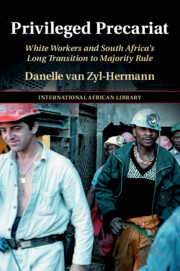Book contents
- Privileged Precariat
- The International African Library
- Privileged Precariat
- Copyright page
- Dedication
- Contents
- Table and figures
- Acknowledgements
- Abbreviations and acronyms
- Introduction
- Part I White workers and the racial state
- Part II White workers and civil society mobilisation
- 4 From trade union to social movement
- 5 An ‘alternative government’
- 6 Discursive labour and strategic contradiction
- 7 ‘Guys like us are left to our own mercy’
- Conclusion
- Bibliography
- General titles
- Newspapers and online sources
- Index
- Series page
4 - From trade union to social movement
The Mineworkers’ Union/Solidarity’s formation of a post-apartheid social alliance
from Part II - White workers and civil society mobilisation
Published online by Cambridge University Press: 17 April 2021
- Privileged Precariat
- The International African Library
- Privileged Precariat
- Copyright page
- Dedication
- Contents
- Table and figures
- Acknowledgements
- Abbreviations and acronyms
- Introduction
- Part I White workers and the racial state
- Part II White workers and civil society mobilisation
- 4 From trade union to social movement
- 5 An ‘alternative government’
- 6 Discursive labour and strategic contradiction
- 7 ‘Guys like us are left to our own mercy’
- Conclusion
- Bibliography
- General titles
- Newspapers and online sources
- Index
- Series page
Summary
Labour reform sent structurally vulnerable white workers in search of new ways to safeguard their race and class interests in a rapidly changing world. This chapter examines how the MWU negotiated South Africa’s long transition to majority rule, from the late 1970s to the union’s centenary in 2002 when it was re-established as Solidarity. This period saw the trade union acquire new leadership, reposition itself as a social movement involved in labour and civil rights issues, and engage overtly in cultural politics. It also expanded its membership to include white-collar and professional workers. The discursive shifts accompanying these organisational changes reveal how expressions of entitlement, rights, and victimhood centred on citizenship, and experiences of loss, humiliation, anxiety, and a lack of recognition shifted from being expressed in terms of class to being expressed in terms of culture and race. Reflecting global shifts towards identity politics and civil society-based action, this facilitated the merger of white working-class responses to the dismantling of the racial state merged with the post-1994 ‘identity struggles’ of the white, specifically Afrikaner, minority. Hence the MWU’s ‘reinvention’ as the social movement Solidarity represented the merger of cross-class Afrikaner experiences and the formation of a new post-apartheid social alliance.
Keywords
- Type
- Chapter
- Information
- Privileged PrecariatWhite Workers and South Africa's Long Transition to Majority Rule, pp. 157 - 197Publisher: Cambridge University PressPrint publication year: 2021



